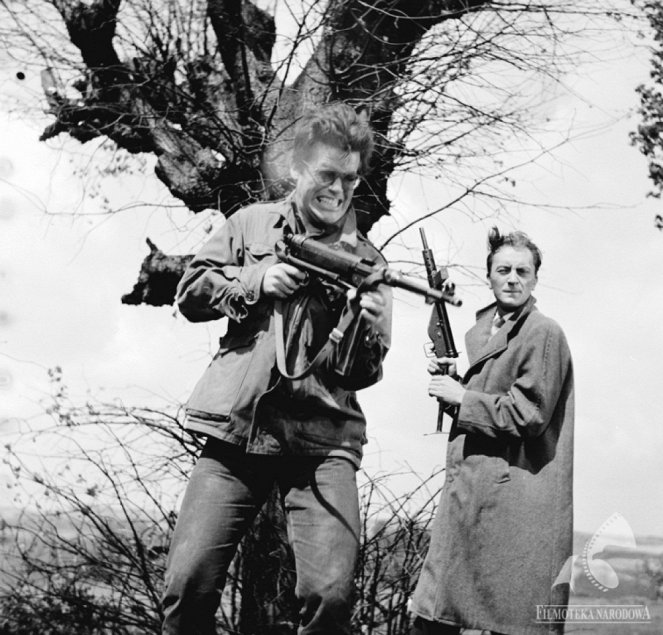Regie:
Andrzej WajdaKamera:
Jerzy WójcikBesetzung:
Zbigniew Cybulski, Ewa Krzyżewska, Wacław Zastrzeżyński, Adam Pawlikowski, Bogumił Kobiela, Jan Ciecierski, Stanislaw Milski, Artur Mlodnicki (mehr)Inhalte(1)
Der junge Widerstandskämpfer Maciek bekommt am letzten Tag des Zweiten Weltkriegs den Befehl, einen Anführer der Kommunisten zu töten. Der war aber mal Macieks Kamerad, und so muss der junge Krieger abwägen, ob er seinen Befehlen folgt oder nicht. (Verleiher-Text)
Kritiken (4)
When the winners lose... Ashes and Diamonds is a very slow (partly due to the length of the shots), very disillusioning, very deep dive into the atmosphere of the time when one war ended and another began. Besides knowledge of the social and political contexts (a communist appropriates everything, with the exception of his son), Jerzy Wójcik’s brilliant camerawork is what forces us to think. No showing off, minimal movement, great depth of field, well-chosen angles. The shot with Christ turned satanically upside down and the subsequent pan to the place with an open coffin in the background is worth a thousand words. In the final part of his war trilogy, Wajda plays with contrasts (fireworks and death, dark blood seeping through a white sheet), subtly referencing his own work (Maciek wears dark glasses because of his time spent wandering in the sewers) and that of others (the film’s title is taken from Norwid’s poem of the same name, the final polonaise stylised along the lines of Stanisław Wyspiański’s play Veselka, which Wajda filmed in 1973). Thanks to the artful cool of Zbigniew Cybulski, the torn romantic hero (abrupt transitions from tragic gloom to cheerfulness) who likes to play with fire (literally), neither the the slowly escalating, dreamy romantic storyline nor the brief encounter with the diamond amidst all the ashes is superfluous. Only the closing scene of suffering seems slightly forced. 80%
()
Given the high rating and overall reputation of the film, it is a cruel disappointment for me - not in terms of the film itself, but its content. It cannot be denied that Wajda demonstrates very decent craftsmanship, excellent direction of the actors, and coordination of all aspects of the film. Perhaps only the execution scene at the beginning and the protagonist's end at the very end of the film reek of theatricality, which, however, was quite common in the 50s. However, in terms of content, it is a strongly biased film that fully corresponds to Wajda's communist conviction. His interpretation of historical events is a low blow considering the fact that, unlike Czechoslovakia where the communists relied on strong domestic support, Poland was under an imposed regime, imported on the tracks of Soviet tanks. The invasion of Poland by the Soviet Union, the execution of Polish soldiers and officers (not just in Katyn!), hundreds of thousands of people dragged into labor camps in Kazakhstan and Siberia, the thorough liquidation of self-government and all elements of independent thinking, the suppression of social, economic, cultural, and religious organizations, and opposition press - none of these elements made it into Wajda's drama. Opponents of communist orders are without exception careerists, alcoholics, adventurers, and terrorists, while high-ranking communist officials have wisdom, persuasiveness, and responsibility. Wajda's film is all the more manipulative because it is professionally shot, the love story in the plot is convincing, and Zbigniew Cybulski in the lead role is excellent and charismatic... My overall impression of 35% is solely for the filmmaking craftsmanship.
()
Wajdas Asche und Diamant findet regelmäßig seinen Platz bei Betrachtungen zur Filmgeschichte. Er ist auch heute noch ansprechend, sowohl was die Thematik als auch was die Form betrifft. Die Geschichte, die durch die Augen eines Soldaten der Landesarmee, gespielt von Zbigniew Cybulski, erzählt wird, vermittelt mit ihrer Aufmüpfigkeit jedem der neuen Zuschauer den dringend benötigten Anreiz, sich an die Wendepunkte der polnischen Geschichte in den Tagen des Mai 1945 zu erinnern. Was jedoch die Frage der anachronistischen Kleidung betrifft, so ist es nach einem halben Jahrhundert nicht leicht zu beantworten, ob sie das wesentliche zeitlose Element ist. Schließlich ist Zbigniew so etwas wie Gérard Philipe, und das ist nichts für mich.
()
Definitely a significant work of Polish cinema, but somehow I couldn't get into it, and the character Maciek didn't help me much with that. I like how it's almost surreal in places, even though it still maintains a grounding in the real world. Maciek's ending is truly well-done and masterfully handled both in terms of direction and acting.
()

